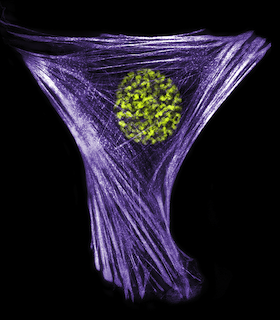
Pere Puigserver, Ph.D.
Pere Puigserver, Ph.D. is Professor of Cell Biology at Harvard Medical School and Dana-Farber Cancer Institute. He received his PhD in Biochemistry from UIB (Spain) that included research at Stockholm University, following postdoctoral work at the Dana-Farber Cancer Institute. He joined the faculty of Cell Biology at Johns Hopkins University School of Medicine in 2002 and subsequently returned in 2006 to the Department of Cell Biology (Harvard Medical School) and Cancer Biology (Dana-Farber Cancer Institute).
The Puigserver Lab focuses on the regulatory molecular mechanisms of core metabolic processes that maintain cell homeostasis and phenotypes. The research program of the Puigserver Lab includes main areas such as 1) mitochondrial biology, 2) intermediary metabolism and, 3) cancer metabolism and energetics. In mitochondrial biology, particular interests are in the regulatory mechanisms that control mitochondrial energetics and biogenesis, with implications in a variety of diseases including metabolic and mitochondrial diseases. In intermediary metabolism, a major focus is in liver and adipose cells and their regulatory mechanisms that control nutrient-derived metabolic and energetic activities. In cancer metabolism and energetics, the Puigserver Lab addresses how these processes drive core cancer biology programs such as cell growth, survival and resistance mechanisms. The Puigserver Lab uses a multidisciplinary experimental design and approaches including chemical and genetic screens in mammalian cells, quantitative metabolomics and proteomics, biochemistry, mouse pre-clinical models of obesity/diabetes, mitochondrial diseases and cancer.
Dana Farber Cancer Institute
Dept. of Cell Biology, LC-6213
360 Longwood Avenue
Boston, MA 02115
Lab telephone: 617-582-7977
Lab fax: 617-632-5363
Int J Obes Relat Metab Disord
View full abstract on Pubmed
Mol Cell
View full abstract on Pubmed
Genes Dev
View full abstract on Pubmed
J Biol Chem
View full abstract on Pubmed
Curr Opin Cell Biol
View full abstract on Pubmed
Science
View full abstract on Pubmed
Cell
View full abstract on Pubmed
Int J Obes Relat Metab Disord
View full abstract on Pubmed
Mol Cell Biochem
View full abstract on Pubmed
Eur J Cell Biol
View full abstract on Pubmed
